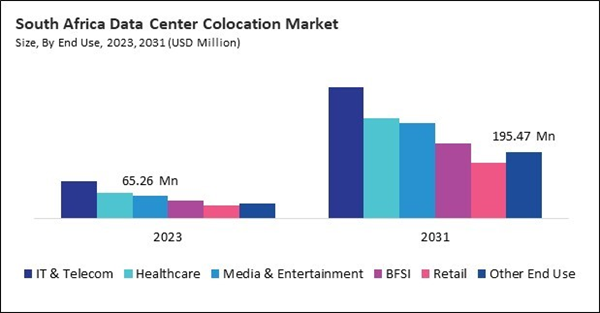The Brazil market dominated the LAMEA Data Center Colocation Market by country in 2023, and is expected to continue to be a dominant market till 2031; thereby, achieving a market value of $3.24 billion by 2031. The Argentina market is registering a CAGR of 19.9% during 2024-2031. Additionally, the UAE market would register a CAGR of 17.1% during 2024-2031.
The growing emphasis on sustainability and energy efficiency has also become a major trend in the market. With data centers consuming massive amounts of electricity, there is increasing pressure to adopt green energy solutions, liquid cooling technologies, and AI-driven energy optimization. Many leading colocation providers, such as Equinix, Digital Realty, and NTT Data, have committed to carbon-neutral operations by investing in renewable energy sources and advanced cooling systems.
Another transformative trend is the increased use of AI and automation in colocation management. AI-powered solutions are deployed to enhance predictive maintenance, workload distribution, and security monitoring. These technologies enable colocation providers to optimize power usage, prevent hardware failures, and mitigate cybersecurity threats in real-time.
In Brazil, the retail sector’s growth is crucial in driving demand for data center colocation. The Brazilian Institute of Geography and Statistics (IBGE) reported a 2.5% rise in retail trade sales between December 2023 and January 2024, with a year-on-year increase of 4.1% in January. This surge highlights the growing dependence on digital commerce, payment processing, and cloud-based customer analytics, all of which require robust data center infrastructure. The expansion of e-commerce, omnichannel retailing, and fintech solutions in Brazil is prompting businesses to seek colocation services to manage their increasing data needs efficiently. As retail enterprises scale operations, colocation data centers provide the necessary infrastructure without high upfront capital investments, making them an attractive option for companies looking to expand their digital footprint. In conclusion, the combined impact of UAE’s data center expansion and Brazil’s retail growth fosters a dynamic market environment.
List of Key Companies Profiled
- Rackspace Technology, Inc.
- Equinix, Inc.
- NTT Data Corporation
- Cyxtera Technologies, Inc. (BC Partners and Medina Capital)
- Iron Mountain, Inc.
- QTS Realty Trust, Inc.
- Cologix, Inc.
- China Telecom Corporation Limited
- CyrusOne LLC
- Zayo Group Holdings, Inc.
Market Report Segmentation
By Type
- Retail Colocation
- Wholesale Colocation
By Enterprise Size
- Large Enterprises
- SMEs
By Tier Level
- Tier 3
- Tier 4
- Tier 1
- Tier 2
By End Use
- IT & Telecom
- Healthcare
- Media & Entertainment
- BFSI
- Retail
- Other End Use
By Country
- Brazil
- Argentina
- UAE
- Saudi Arabia
- South Africa
- Nigeria
- Rest of LAMEA
Table of Contents
Companies Mentioned
- Rackspace Technology, Inc.
- Equinix, Inc.
- NTT Data Corporation
- Cyxtera Technologies, Inc. (BC Partners and Medina Capital)
- Iron Mountain, Inc.
- QTS Realty Trust, Inc.
- Cologix, Inc.
- China Telecom Corporation Limited
- CyrusOne LLC
- Zayo Group Holdings, Inc.









